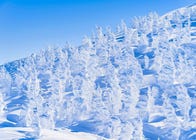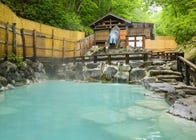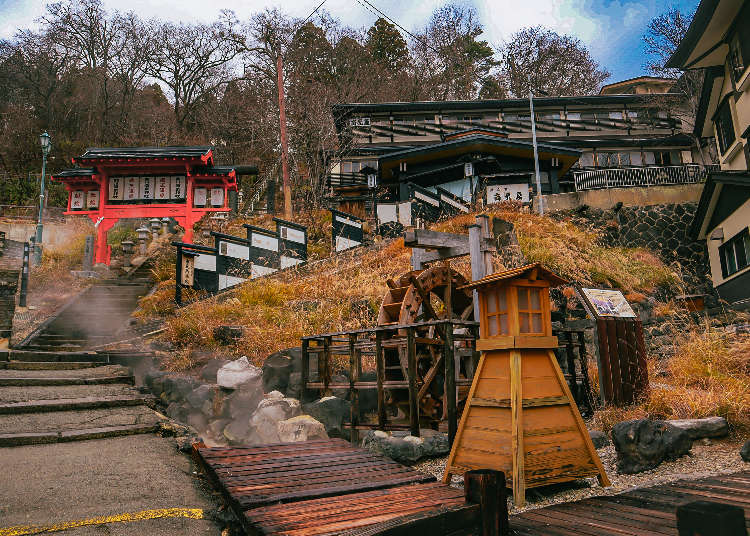
Plan your perfect Zao Onsen getaway with our comprehensive guide. Discover the best hot springs, ski resorts, and local attractions for an unforgettable vacation in Yamagata.
(Main image courtesy of Expedition Japan.)
Welcome to Zao Onsen
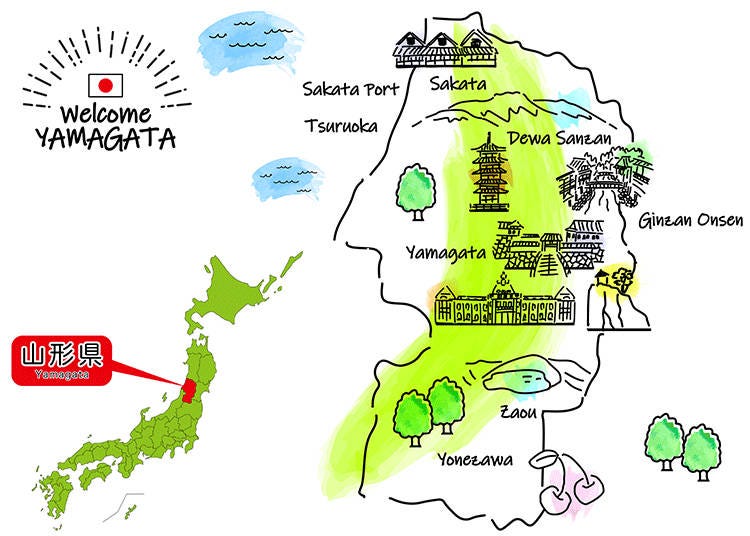
Nestled in one of Japan's most mountainous and seismically active regions, Yamagata Prefecture boasts some of the country's most exquisite onsen hot springs. These rejuvenating waters, sourced from the depths of active volcanoes in northern Japan, possess distinct qualities, and among them, the sulfuric waters of Zao Onsen are renowned for their natural exfoliating properties that bring visitors from far and wide.
Getting to Zao Onsen
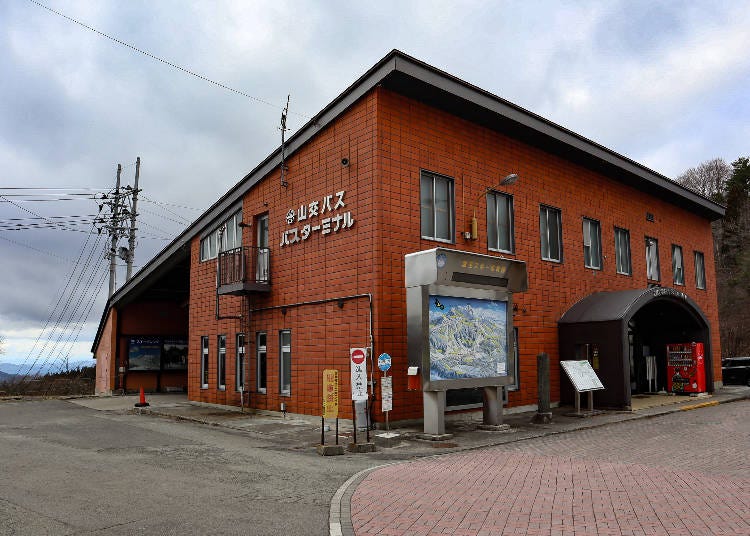
The first thing to understand about Zao is that there is no real “Mount Zao.” Zao actually refers to the cluster of stratovolcanoes that divides Yamagata and Miyagi Prefectures.
Therefore, there is Miyagi Zao and Yamagata Zao, and a number of ways that the mountain range can be enjoyed. However, the Zao Onsen area, where the Zao Onsen Ski Resort is located in Yamagata, is easily accessible from Yamagata City.
The easiest way to get to Zao Onsen from Tokyo is to take the 2 hour and 45 minute Yamagata Shinkansen to Yamagata Station (11,250 yen) and then take the Z90・C2 bus (1,000 yen) to Zao Onsen Bus Terminal (蔵王温泉BT行) which will take roughly another hour. The bus comes roughly every hour, and the last departure is 6:55 PM, so make sure you plan accordingly.
Historical origins of Zao Onsen
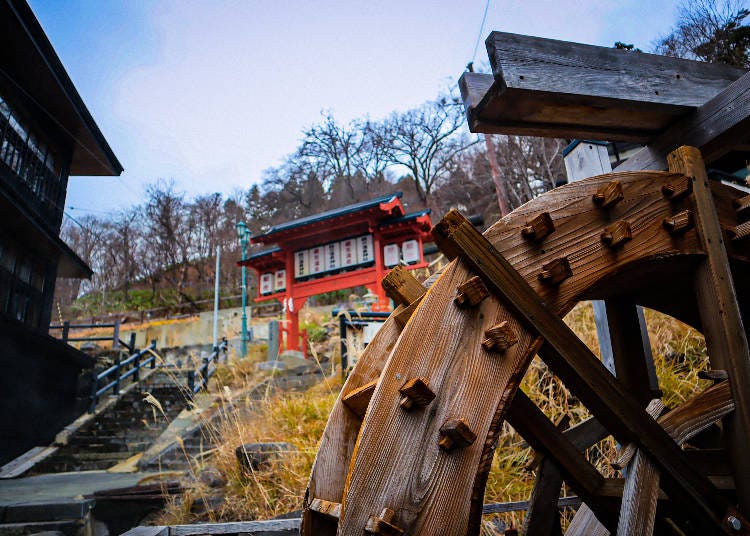
Looking back at the early history of Japan, the original inhabitants of Japan were the Jomon people, who were widely dispersed across the Japanese archipelago from south to north between 10,000 and 300 B.C.
Around 300 BC, they were gradually displaced northward by migrants from the Korean peninsula known as the Yayoi. The Yayoi people eventually consolidated into the Yamato, forming the genealogical ancestors of modern Japan. Meanwhile, the remaining Jomon population, now known as the Emishi, retreated to the northeastern Ezo region, which we commonly refer to as Tohoku today.
The Emishi maintained a comparatively primitive lifestyle in tribes and local villages, in contrast to the Yamato, who developed cities with socio-economic hierarchies.
This vulnerability led to conflicts, with the Yamato gradually conquering more territory, a transformation depicted in Hayao Miyazaki's Princess Mononoke.
The earliest records we have of Zao Onsen date back to as early as 110 AD when Prince Yamato Takeru embarked on a military expedition to conquer the untamed wilderness of Ezo. According to legend, amid a fierce battle during a snowstorm, his lead commander, Kibino Tagayu, was fatally shot by a poisoned arrow.
As Tagayu fatefully awaited death in the wintry blizzard, he discovered a beautiful wild cherry tree on the mountain peak. Wishing to witness one last moment of beauty, he plucked a branch from the tree, causing hot water to gush forth, magically healing his wounds and creating Zao Onsen.
Whether or not you believe this legend to be true or not, it is undeniable that since ancient times, Zao Onsen's waters have been renowned for their healing powers, making them the perfect place to soak, relax, and watch your ailments melt away.
What makes Zao Onsen so special in winter and summer?
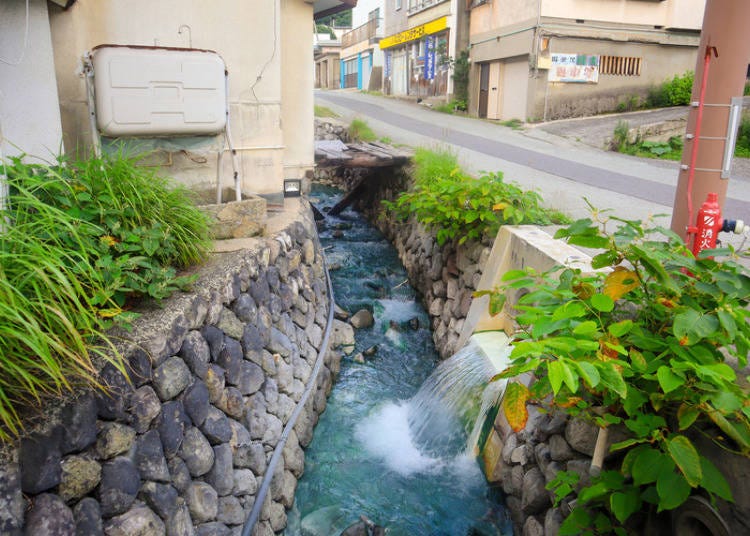
One thing that makes Zao onsen truly unique is its incredible exfoliating abilities that leave your skin slippery-smooth, eliminating dead skin cells and giving you that natural glow. With a PH near 1, the waters of Zao are flushed with minerals like sulfur, and it is one of the most acidic onsen in all of Japan.
The waters of Zao are also said to help improve blood flow as well as alleviate muscle fatigue, so the onsen is particularly popular with skiers and hikers looking to heal up after their mountain adventures. The Zao Onsen town itself is not so large that you’ll find yourself lost, but yet not so small that the magic and luster of exploration are absent.
Traditional ryokan inns and shops hem the tight allies that ascend up from the bottom of a hill to the base of the slopes, and walking around the town as the sun sets over the horizon is known to lead to pangs of unexpected nostalgia for a time forgotten long ago. Walking around Zao Onsen town, one might notice steam wafting up from vents in the road, ingeniously designed to use the natural heat of the hot spring water to prevent the roads from freezing over during the winter.
While the steamy hot spring water is one of the many boons of fortune that Zao is blessed with, it also comes at a price. Residents of the town tend to have to replace many home appliances, such as refrigerators, microwaves, and televisions, every few years, as the sulfur naturally discharged from the hotspring corrodes the electrical components of the machines.
Short-term visitors need not be alarmed, however, as this is a process that builds up and compounds over time. One other thing to note about Zao Onsen is that its sister onsen is Kaminoyama Onsen, also in Yamagata Prefecture, and is just a short distance away. While Zao Onsen is acidic and good for exfoliating, Kaminoyama Onsen is alkaline and moisturizing, so it is recommended to visit Kaminoyama after Zao to nourish your skin and replenish the dead cells.
What to do in Zao during the winter?
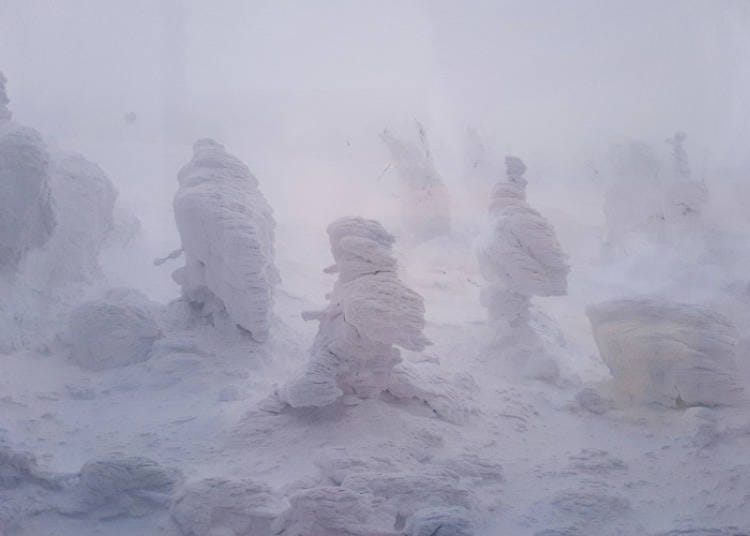
The Zao Snow Monsters are one of the most iconic images associated with Zao and are almost synonymous with Yamagata Prefecture as a whole. Zao Ski Resort receives some of the highest annual snowfall globally, with temperatures during peak winter months dropping to as low as -20°C (4°F).
While the idea of a frosty landscape might seem daunting, the deep winter season is a paradise for winter sports enthusiasts. Zao Onsen Ski Resort stands as one of the world's most unique locations for skiing and snowboarding as you carve in and around the Snow Monsters, with a sprawling view of Yamagata City right on the horizon.
Ropeways and gondolas provide breathtaking views of the monsters for both skiers and non-skiers alike, as many visitors will take the lift up just to witness and take pictures of the snow monsters on top. For non-skiers, snowshoeing is another rewarding way to experience Zao during the wintertime. However, it is highly recommended that you go with an experienced guide as it can be easy to get lost.
As the sun sets, Zao transforms into a dazzling wonderland with mass illuminations of the snow monsters around the summit, visible from outside or enjoyed within the comfort of mountainside cafes or onsens. The nighttime ropeway experience alone is priced at 3,800 yen for adults and 1,900 yen for kids.
-

-
Address
Zao Onsen, Yamagata City, Yamagata Prefecture, 990-2301
View Map -
Nearest Station
Yamagata Station (Ou Line / Yamagata Line / Yamagata Shinkansen)
- Phone Number 023-694-9518
-
Address
Zao Onsen, Yamagata City, Yamagata Prefecture, 990-2301
What to do in Zao during the summer?

During the warmer seasons, there’s no need to fear monsters, as summer offers favorable weather for outdoor activities like hiking and mountain biking.
Okama Crater Lake, also known as Goshiki Numa, translates to the Five-Color Lake and will take your breath away. The lake gets its name from the unique geothermal conditions that cause the waters to seemingly change colors throughout the day with the fluctuations in water acidity.
Spanning approximately 1,000 meters, the lake is nestled within a crescent moon-like rock formation, resembling a unique eye. A hiking trail from Okama Crater to one of Zao’s secondary peaks, such as Kattadake, is idyllic during the summer and fall; however, be warned that without much tree coverage up top, the direct sunlight can be harsh.
Other stops along the hiking route include a shrine, a visitor center, a restaurant, and several cultural sites as well. Hiking routes offer flexibility, with multiple ropeway drop-off points, but a trek from the bottom to the top takes around 4 hours each way.
Alternatively, private cars or buses provide access to the mountain’s summit, though road closures in winter due to heavy snowfall should be considered.
-
Okama Crater御釜
- Address Zao no Okama, Kuraishidake National Forest, Togattaonsen, Katta District, Zao, Miyagi 989-0916
How to enjoy the Onsen of Zao
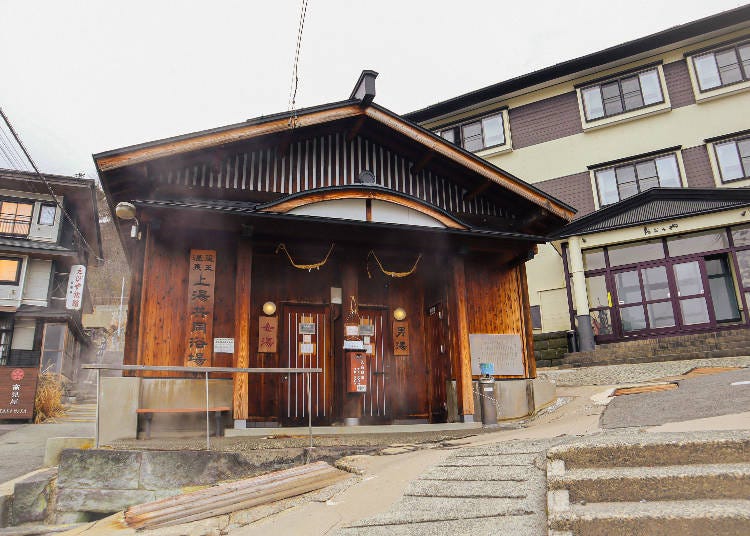
While the mountains have plenty to do and enjoy, what is there to do in the actual Zao Onsen Town? The first and most obvious answer is to take a long, hot soak in the onsen hot springs, of course!
In Zao Onsen Town, there are three public bathhouses: Kamiyu, Shimoyu, and Kawarayu. They are all open year-round, operate between the hours of 6 AM and 10 PM, and cost only 200 yen!
All three bathhouses are unmanned, so you just put your money in the coin slot and don’t forget to bring or purchase your own towel locally, as they are not provided.
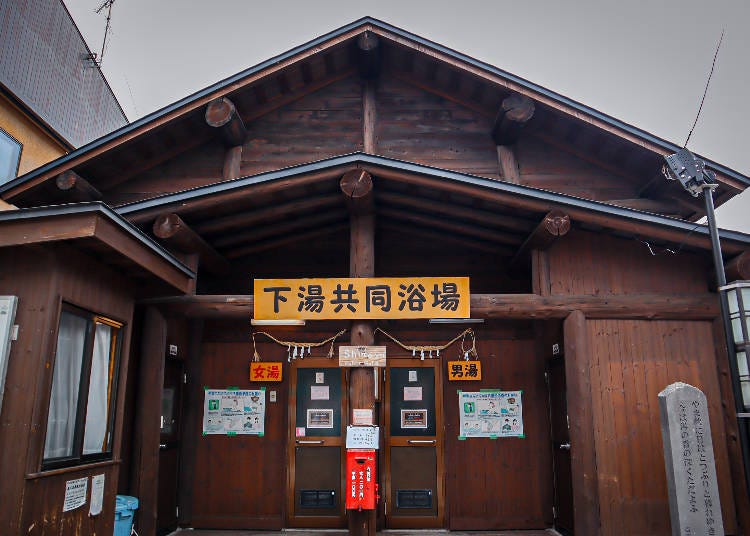
For those who are looking for a more luxurious experience, there are five day spas in the area that are simply magical. Shinzaemon no yu, Genshichi open-air spa, Sunokoyu monogatari Kawaraya, and Zao Onsen Dairotenburo.
The Zao Onsen Dairotenburo is only open during the warmer months; however, it is particularly coveted by onsen enthusiasts as the massive open-air bath that can accommodate up to 200 people at a time is fully immersed in the pristine nature of the Zao mountainside. Zao Onsen Dairotenburo is also one of the rare hot spring baths in Japan that indiscriminately allows visitors with tattoos to take a soak without even the need to cover them up!
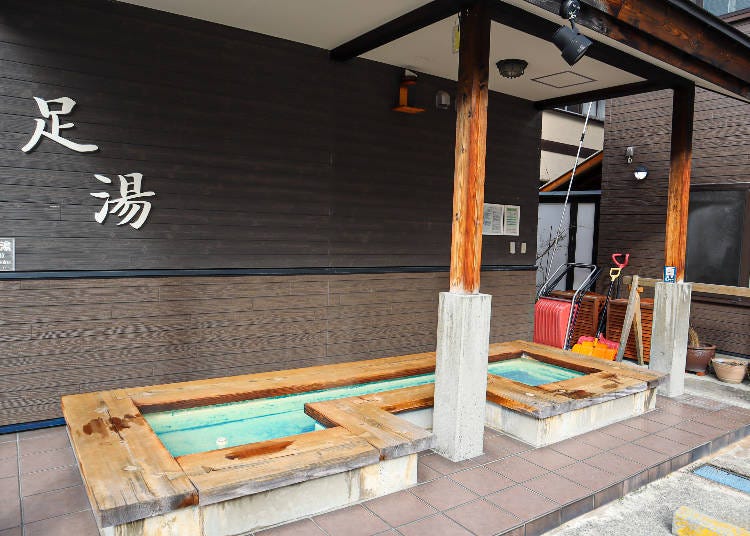
For those not committed to getting fully undressed and taking a dip in the onsen, you’re in luck!
There are three onsens scattered around town that all make use of the healing natural hot spring waters of Zao.
Shimoyu, Robata, and Shinzaemon no yu footbaths are all available for free and are great for aching feet after a long day of hiking or a steep day on the slopes.
Where to eat in Zao Onsen
Yamagata has some of the finest cuisine in all of Japan, and with fresh seasonal ingredients available year-round, disappointment is never on the menu at any of Zao’s fine establishments.
Yamagata Sake Museum

While Zao is best known for its onsen and natural splendor, did you know that the sake of this region is famous as well? Yamagata was the first region in Japan to be awarded a GI (Geographic Indication) for their sake, and every year at the Japan Sake Awards, Yamagata Prefecture consistently brings home the most amount of gold medals.
78% of all the sake produced in Yamagata is considered premium grade, as compared with the nationwide average of just 34%. To encapsulate the greatness of all of Yamagata’s sake, the Yamagata Sake Museum has hundreds of bottles of Yamagata Sake on tap from 49 breweries across the prefecture, and you can sample and try them as you please.
When paired with local delicacies at the in-house restaurant, it is a match made in heaven and the perfect way to enjoy the many spoils that Yamagata has to offer.
-
Yamagata Sake Museum山形酒のミュージアム
- Address 951 Zaoonsen, Yamagata, 990-2301
・Website: https://www.zao-sake.com
Zao Brewery
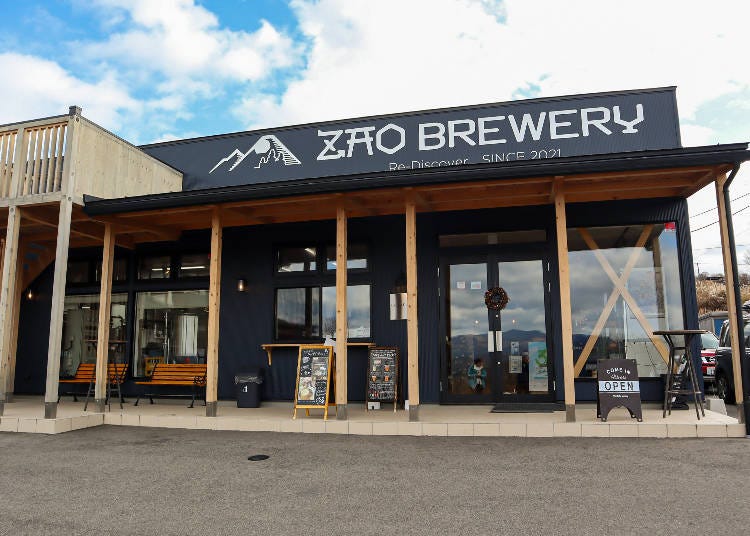
While Yamagata has a long-standing history of producing high-quality, award-winning sake and wine, in 2021, Zao Brewery showed up to the alcoholic beverage game and completely knocked it out of the ballpark!
With four original craft beers that take inspiration from the wonders of Zao on tap and seasonal brews as well, Zao Brewery is a wonderful place to get a bite to eat as you explore the charming hot spring village.
The menu features Western-style delicacies at a reasonable price, and everything pairs perfectly of course, with the beer.
-
Zao Brewery蔵王ブルワリー&クラングダイニング
- Address 1096-18 Minamizaka, Kurakou Ueno, Yamagata, 990-2303
・Website: https://www.zao-brewery.jp
Robata
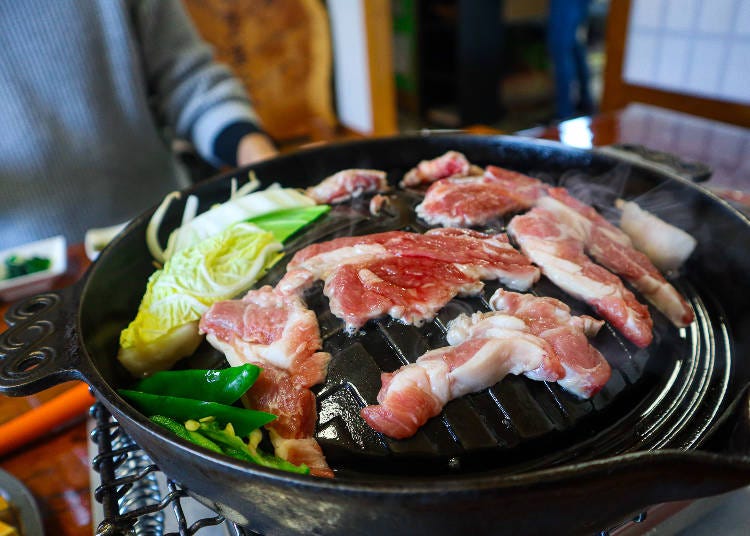
Jingisukan is a type of Japanese-style Mongolian barbeque that, despite being most famously associated with Hokkaido, is also found here in Yamagata.
While the interior of Robata is fairly minimalistic and simple, right when you walk in the door, the enticing aroma of roasted meat wafts through the air, makes your mouth water, and the hunger in your belly intensifies to an almost unbearable degree.
Guided to a table equipped with a built-in hot pan, you'll find it soon slathered in fresh vegetables, mushrooms, and the star of the show, the lamb.
This amazing meal will only set you back 1,540 yen, but if you’re still hungry, you can always order seconds!
-
Robata蔵王温泉「ろばた」
- Address 42-5 Kawahara, Zao Onsen, Yamagata City, Yamagata Prefecture 990-2301
・Website: https://t023.com/meal0.html
Where to stay in Zao Onsen
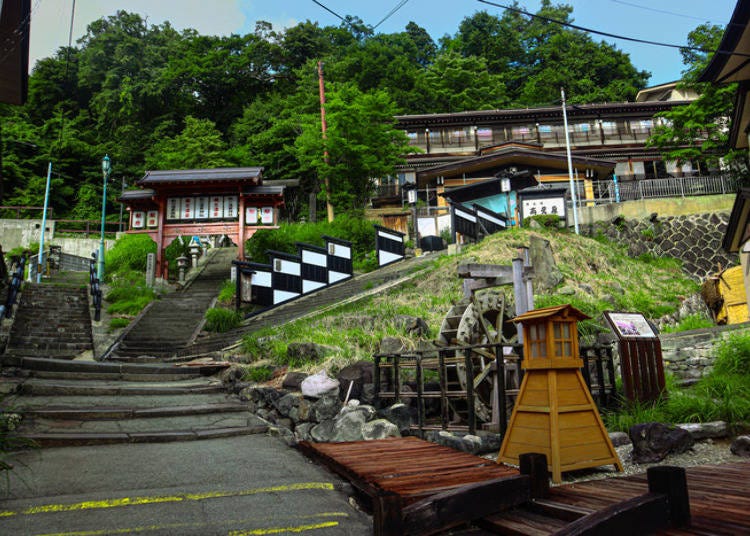
Is it worth it to spend the night up in Zao? While a day trip to Zao Onsen from Yamagata City can be plenty rewarding, spending the night fully immerses you in the experience and really lets you get lost in the magic of this romantic onsen town.
During the winter, after skiing the day away, retreat to the comforts of a charming local ryokan, where you can take a bath and enjoy a luxurious feast of seasonal cuisine.
In the summer, explore the many hiking trails of the mountain at your own pace and sample local sake in the evening as you gaze up under the stars.
Takasagoya Ryokan
For an authentic local experience, consider staying at Takasagoya, a local inn that is operated by a multi-generational family.
While the rooms are all simple yet pleasant, the cuisine at Takasagoya is out of this world, with many customers returning annually just to get a bite of something truly special.
The menu reflects the changing seasons, featuring Yamagata specialties like imoni (a savory taro and beef stew) during autumn and Zao's renowned karakarajiru (miso soup with pork, daikon radish, carrot, burdock root, etc.) and sukiyaki made with Yamagyu in the winter.
While the inn doesn't have its own natural onsen, it offers an indoor, manmade mineral hot spring.
Additionally, guests receive entrance tickets to enjoy any of the three public baths (Kamiyu, Shimoyu, or Kawahara) in the vicinity.
-
 Takasagoya Ryokan高砂屋旅館
Takasagoya Ryokan高砂屋旅館- Address Zaoonsen 23, Zao Onsen, Yamagata View Map
- Original source: Booking.com
Vacancy search, reservation
-
from 17,000JPY 1room, 2adults
Check with our partner site as the latest rates, rate details, and guest room requirements may vary.
Zao Shiki no Hotel
For those looking for a more luxurious option, Zao Shiki no Hotel sits perched on a scenic alcove over the city and has large, spacious rooms that incorporate the best of both modern Western and traditional Japanese design.
The onsen peers out over the mountainside, giving you an unforgettable view of Zao’s seasonal beauty.
Top-quality Yamagata beef is a menu highlight, and ingredients are all locally sourced with great attention to detail.
In the morning, a breakfast buffet with a diverse array of both Japanese and Western dishes makes for the perfect cap for a great stay, and will be having you look forward to another visit soon.
-
 Zao Shiki no Hotel蔵王四季のホテル
Zao Shiki no Hotel蔵王四季のホテル- Address Zao Onsen 1272, Zao Onsen, Yamagata View Map
- Original source: Booking.com
Vacancy search, reservation
-
from 23,306JPY 1room, 2adults
Check with our partner site as the latest rates, rate details, and guest room requirements may vary.
Wakamatsuya
And for the slope and sake lover, Wakamatsuya is cozied up right beside and managed by the same team as the Yamagata Sake Museum and is an endearing Japanese-style inn. Guests enjoy the convenience of a complimentary shuttle service from Zao Onsen Bus Terminal and Zao Onsen Ski Resort's Uwanodai and Yokokura slopes (reservations are available at the front desk), and both western-style and Japanese-style rooms are available. Indoor and outdoor onsens, of course, are part of the experience, and an exclusive 24-hour private onsen is available for overnight guests. Wakamatsuya proves to be an excellent option for solo travelers and families alike, as it has something to offer everyone.
-
 Wakamatsuya蔵王・和歌の宿 わかまつや
Wakamatsuya蔵王・和歌の宿 わかまつや- Address Zao Onsen 951-1, Zao Onsen, Yamagata View Map
- Original source: Booking.com
Vacancy search, reservation
-
from 33,353JPY 1room, 2adults
Check with our partner site as the latest rates, rate details, and guest room requirements may vary.
Other places to stay in Zao Onsen include Zao Kokusai Hotel, the ryokan Meitoya So, and <@Zao Onsen Omiya Ryokan|@>.
Is Zao Onsen worth it?
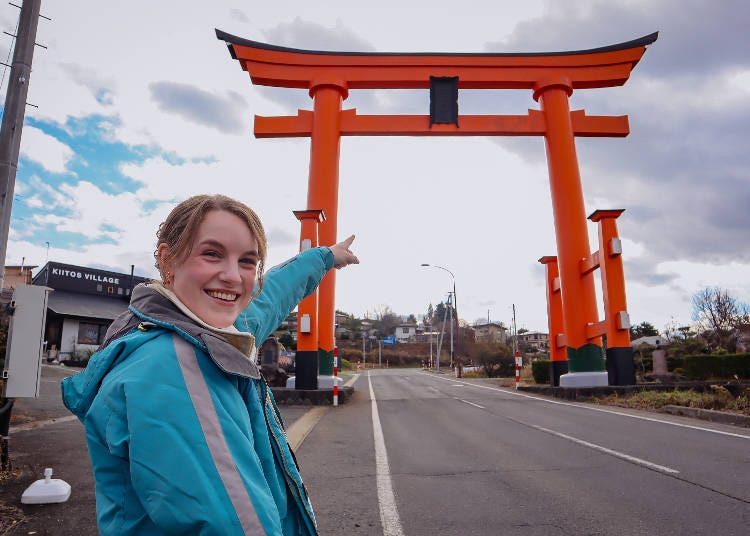
If this article hasn’t convinced you already, the short answer to that question is YES! Zao Onsen boasts a number of incredible activities throughout the year that cannot be experienced anywhere else in Japan and makes for the perfect getaway from the hustle and bustle of the city.
Making the journey out to Zao Onsen is a great trip for the family or a group of friends, or the couple looking for a romantic getaway.
No matter who you go with or what you go with, one thing is certain: the memories you make up in Zao Onsen will be sure to last a lifetime.
Written by: Alexander Litz
*Prices and options mentioned are subject to change.
*Unless stated otherwise, all prices include tax.
Popular Tours & Activitiess
Recommended places for you
-

Ginzan Onsen
Hot Springs (Onsen) & Bath Houses (Sento)
Surrounding Areas Of Yamagata
-

Zuiganji Temple
Temples
Sendai And Matsushima
-
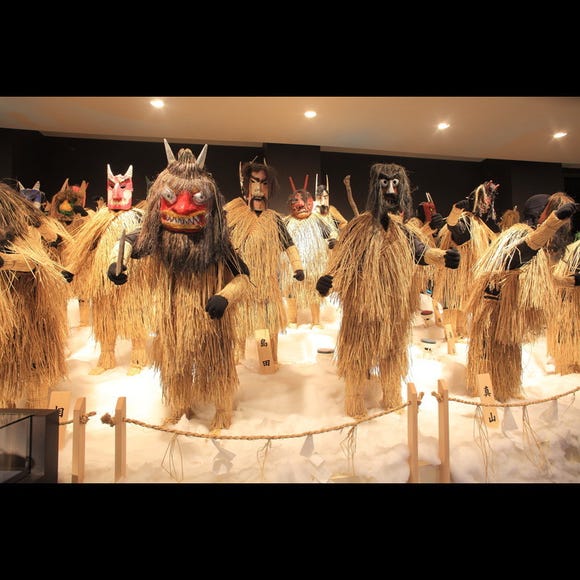
Namahage Museum
Other Museums
Surrounding Areas Of Akita
-

Lake Tazawa
Rivers, Lakes & Canyons
Surrounding Areas Of Akita
-

Akiu Onsen
Hot Springs (Onsen) & Bath Houses (Sento)
Sendai And Matsushima
-
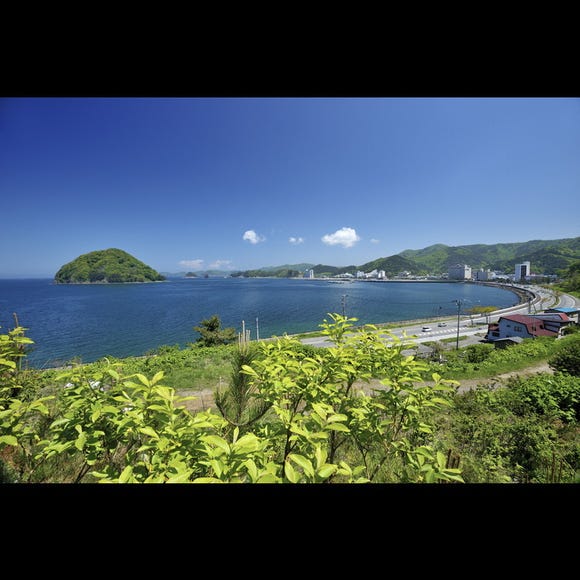
Asamushi Onsen
Hot Springs (Onsen) & Bath Houses (Sento)
Aomori, Hirosaki And Hachinohe
-
Ad

Start Your Journey from Yamagata Station: Explore Four Seasons of History, Hot Springs, and Festivals
-
Ad

Scandinavian Brands Meet Harajuku: Inside Japan's Only Flagship Stores for Haglöfs and D_b_
-
Ad

Discover Kanazawa: History, Culture, and How to Get Around with Ease
-

Shopping in Niigata: 9 Must-Buy Souvenirs & Local Sake to Take Home
by: ShiroKu inc.
-
Ad

Explore Samurai City Aizu-Wakamatsu: Your Full Guide to History, Nature, and Culture
-

8 Luxury Tohoku Ryokans: Private Onsen, Gourmet Wagyu, and Winter Views
by: Sae Haneda
-

Nyuto Onsen: Famous Baths with Breathtaking Winter Sights in Akita's Renowned Hot Spring Village
-

5 Best Things to Do in Akiu Onsen: Fun Spa Day Trip Close to Sendai
-

Secrets to Shopping in Japan: Guide to Annual Sales in Japan & Where to Shop
by: Miyu Shimada
-

We Board Japan's 'Setsugekka' Resort Train And Have An Incredible Journey Through The Heartland
-

5 Ryokan in Akiu Onsen You'll Want to Bookmark for a Tohoku Trip
by: Guest Contributor
-

10 Must-Visit Places for Autumn Leaves in Tohoku: Naruko Gorge, Geibikei Gorge & More (2025)
by: Guest Contributor














